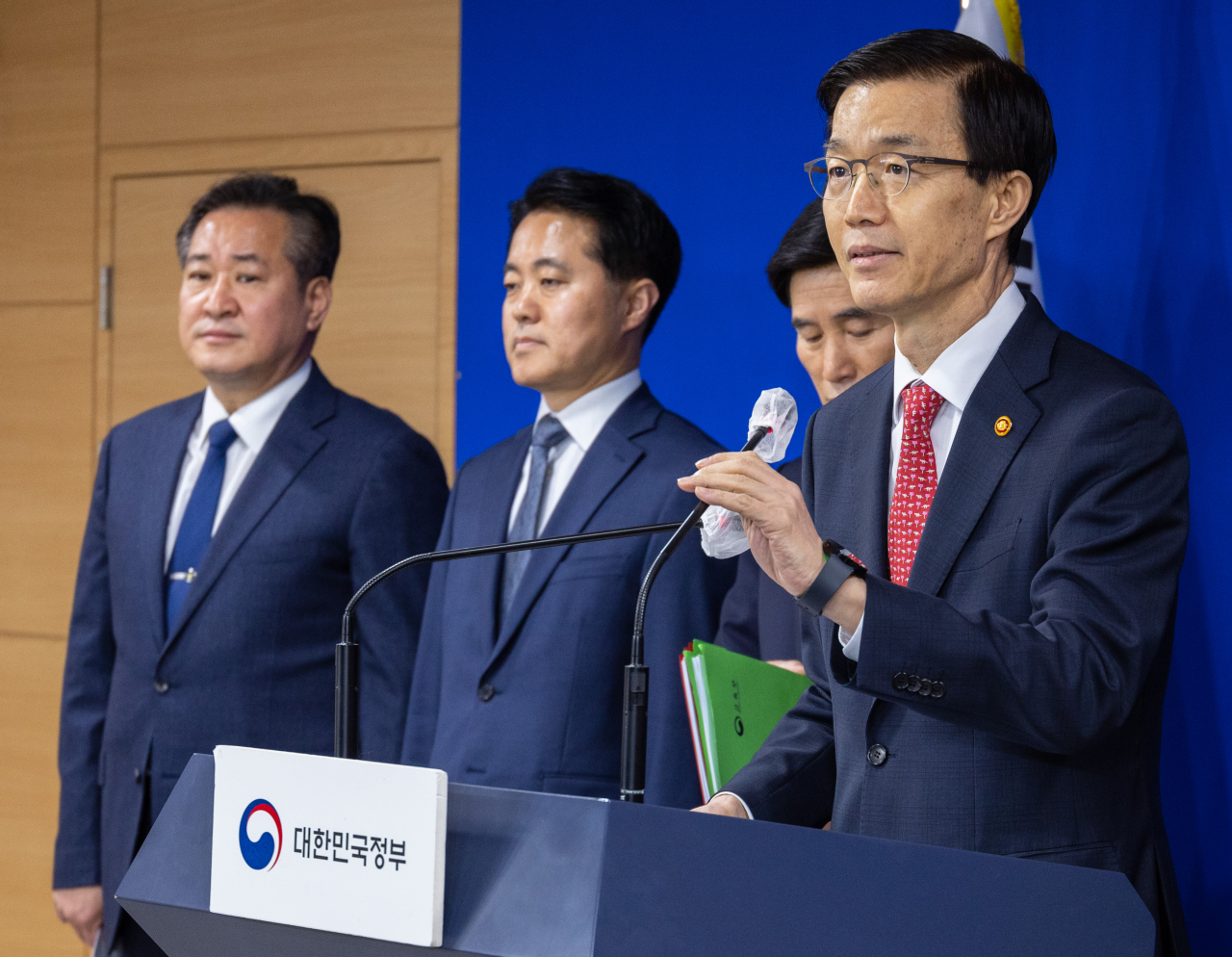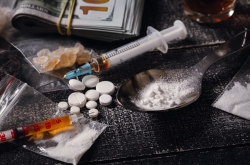 |
Bang Moon-kyu (right), minister of the Office for Government Policy Coordination, speaks at a briefing at the Government Complex Seoul Tuesday. (Yonhap) |
South Korea on Tuesday vowed harsher crackdowns on drug trafficking activities at all fronts by ramping up punishment, monitoring and education through a pan-governmental push.
The plans reviewed at a Cabinet meeting Tuesday in the presidential office will be aimed at stamping out teenage drug use, President Yoon Suk Yeol said during the meeting.
Yoon said he finds it "alarming" to see that illegal drugs are easy to find among adolescents, leaving them in jeopardy.
"A decade before, Korea was able to keep its status as a drug-free country with the coordination of Korea's law enforcement authorities like the prosecution, the police and the coast guard, along with the health authorities and customs altogether," Yoon said.
"But at some point, the government began becoming complacent, in a way that illegal drugs began to destroy not only ordinary people's minds but also the young generation's hopes and dreams."
The plan comes six months after a pan-governmental drug prevention committee was established in November. The committee is headed by Bang Moon-kyu, minister of the Office for Government Policy Coordination.
For example, online advertisements promoting illegal drugs, doctors illegally prescribing higher than necessary doses and those with drug abuse records who get prescribed multiple drugs from different doctors will all be monitored by the government. Korea stores sets of databases for drug-related keywords, as well as for 600 million drug prescription records, according to the government.
Penalties imposed on drug offenders are also set to become more stringent. Korea defines 45 drug-related crimes under the current sentencing guideline, and those violating 38 of them can avoid imprisonment. Less than half of the drug offenders avoided conviction in 2022, according to the Supreme Court data.
On the educational front, a committee dedicated to drug prevention will be composed of drug experts, teachers and government officials. As for rehabilitation, Seoul plans to establish a new drug rehabilitation center in Daejeon, bringing the total number of centers nationwide to three. Also, medical professionals who treat drug addicts will be provided higher incentives.
 |
Actor Yoo Ah-in (Nowfilm) |
The stricter measures come in the wake of high-profile drug crime cases here, Bang said during a press briefing held at the Government Complex Seoul.
Earlier in April, seven people were arrested for making and distributing 100 bottles containing drug-laced material disguised as drinks that help students concentrate while studying in a neighborhood in Gangnam-gu, Seoul. According to police, eight students and a parent have fallen victim to the unwanted exposure to drugs as of Monday.
Moreover, actor Yoo Ah-in was arrested in March for drug abuse, as he tested positive for a variety of drugs such as propofol, cannabis, cocaine and ketamine.
"While pan-governmental measures have been in the works, we had no choice but to come up with follow-up measures to eradicate drugs that are threatening ordinary people's daily lives, in light of the drugged drink incident near Gangnam cram schools and celebrities doing drugs," Bang said.
According to data collected by the committee over four months from November 2022 to February of this year, the government confiscated 306.8 kilograms of illegal drugs and arrested 5,809 drug offenders, according to Bang. The volume of confiscated drugs rose 55 percent on-year, while the number of drug offenders arrested jumped 24 percent.
In the meantime, 1,071 drug addicts went through a drug rehabilitation program during the four-month period, 2 1/2 times the figure from the same period in the previous year.
Moreover, all Korean primary and secondary schools are obliged to carry out at least 10 hours of drug prevention education each year beginning in 2023.


![[Out of the Shadows] Chun Woo-won, superrich Koreans in US, and drugs](http://res.heraldm.com/phpwas/restmb_idxmake.php?idx=605&simg=/content/image/2023/04/02/20230402000154_0.jpg)
![[Out of the Shadows] Gangnam student drugging incident rattles Korea](http://res.heraldm.com/phpwas/restmb_idxmake.php?idx=605&simg=/content/image/2023/04/10/20230410000576_0.jpg)






![[Today’s K-pop] Blackpink’s Jennie, Lisa invited to Coachella as solo acts](http://res.heraldm.com/phpwas/restmb_idxmake.php?idx=644&simg=/content/image/2024/11/21/20241121050099_0.jpg)
